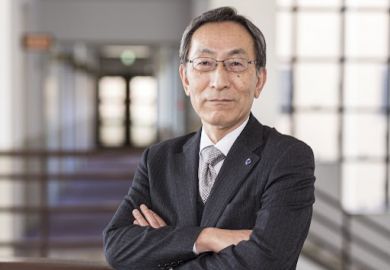The UK’s public research funder is “as prepared as we could be” if the knock-on effect of trade negotiations with the European Union means the UK does not associate to its research programme, a conference has been told.
Andrew Thompson, UK Research and Innovation’s (UKRI) lead on international issues, confirmed at a Universities UK (UUK) conference that plans for a “discovery fund” to replace UK involvement with flagship programmes such as the European Research Council were in the pipeline.
However, he did not say when such a fund would be up and running, only that the funder had “transitional plans” in some areas to “smooth the bridge” to a landscape without association to the EU’s overall Horizon Europe programme, if that is what happens.
The UK government has said that it wants to fully associate to Horizon Europe but with no agreement in sight and overall UK-EU trade negotiations hanging in the balance, concerns are growing that the country will not be involved.
“To try and make sure that there is no funding gap emerging at the end of this year, and in the event that we don’t associate or there is a delay in association, we’ve been putting in place alternative plans,” explained Professor Thompson at the UUK’s online research and innovation conference.
These included the eventual launch of the discovery fund, the kind of scheme proposed in last year’s review of support for international collaboration in the wake of Brexit by Sir Adrian Smith and Graeme Reid.
Professor Thompson said such a fund would include “sizeable grants over long periods to early-, mid- and late-career researchers whether they are based in the UK or coming from other parts of the world” to “pursue discovery-led and ground-breaking research”.
In the interim, there were also plans for “transitional uplift” funding for fellowships run through the UK’s national academies and research councils and extra backing for institutions that might take part as third-country participants in Horizon projects, he added.
“We have some transitional plans to uplift funding in the academies and UKRI in order to smooth the bridge” to a discovery fund, he said. “I think we are as prepared as could be.”
He also stressed that UKRI was pursuing bilateral research collaboration opportunities with EU and non-EU member states including Switzerland and Norway.
“I think it is really important to emphasise that we want to work bilaterally as well as multilaterally with Europe. They are both important; it is not either or,” he said.
But whether the UK associated to Horizon Europe or not, he also stressed that UKRI wanted a more “strategic and geographically balanced portfolio” when it came to international research collaboration.
“Historically, we have tended to ‘chunk out’ the funding; we have had blocks of funding for Europe, blocks for lower- and middle-income countries and then not so much for…the rest of the world,” said Professor Thompson, executive chair of the Arts and Humanities Research Council.
“All three of those boats need to be floated simultaneously,” he added, which would mean “expanding the geography of our international collaboration beyond Europe and beyond the Global South”, while not cutting back collaboration in those parts of the world.
Meanwhile, he also praised the Global Challenges Research Fund amid worries in the research community that the government’s decision to cut back overseas aid spending will affect the funding stream, which counts as part of that budget.
“It is a flagship fund showing international leadership and I would hope the government would be able to recognise that in the context of a difficult spending review,” Professor Thompson said.
Another speaker at the conference, Dame Nancy Rothwell, vice-chancellor of the University of Manchester, also said planned cuts in the government’s official development assistance budget, announced in last month’s spending review, were a “big concern”.
“Most universities play a huge role in tackling global problems…these are often funded through these sources and we will certainly be arguing hard to maintain the aspect of the overseas development aid that funds the global research that we all take part in,” she said.




